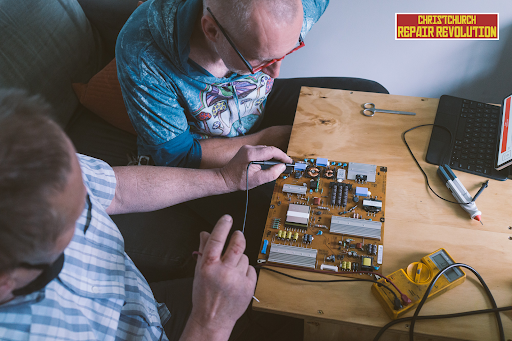This is the second in a three part series of blogs that look at: 1: Why Repairs Cafes Matter; 2. The policy needs for a right to repair; 3. What a repair future would look like.
Part 2: Changing the policy settings
As much as I love Repair Cafés, I started this petition because we need policy change to make sure products that are designed to be repairable and durable, not to be thrown away.
Our elected representatives can pass laws that require products to last longer and be easier to repair. We’re leading a petition calling on our Government to ensure:
- things are easy to repair – manuals are available and repair tools are affordable and designed to work across various products
- repair services are accessible and affordable for everyone
- ensure products are designed to be repairable. We should expect products sold in New Zealand to meet basic standards of durability and repairability.
- producers and retailers make spare parts available, so items are easy to fix.
We know this needs to be a collaboration between government, community, consumers and the industry.
Repair services need to be accessible and affordable for everyone. Both central and local government can ensure equitable access by actively supporting the growth of community-based repair services. They could also introduce reliable funding mechanisms for these businesses and organisations.
When purchasing products in Aotearoa New Zealand, it can be difficult to tell whether a product is good quality or easily repairable, due to a lack of information. To make good purchasing decisions we need reliable information on how to repair a product to maintain it for way more than a year or two.
For example with some products, we can’t even get into these things to fix them because they’re sealed! In a cell phone, I saw the battery was glued in, so it makes it really hard to take it apart and get it repaired. That’s called planned obsolescence, which fails to respect the already overstretched capacity of the planet to be buried under a mountain of waste.
Our friends at Consumer NZ found in a recent investigation that some retailers send new, but faulty, small appliances returned to the shop straight to landfill.
We could introduce a ‘repairability index’ (similar to what has recently been introduced in France) so we can see how easy it is to get an item repaired before we buy it. Consumer NZ want to do just this, and develop a labelling or certification scheme to be displayed on key products, such as electronics, furniture and textiles, so consumers know how long a particular product is expected to last. This is a great idea!
There are independent repairers still out there, and we need to support them to have access to the tools and information they need to fix broken items. This could be done through expanding education in the repair skill sector, updating consumer law, copyright law and the waste minimisation act.
Support the call and sign the petition: Make it our Right to Repair

Call on Minister for the Environment, Hon David Parker to bring in ‘right to repair’ measures so it’s easier and cheaper for New Zealanders to get items repaired.
Sign the petition


